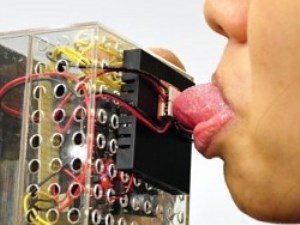



Date:14/11/16
 With sight, sound, smell and touch now digitised, only one human sense remains for computers to conquer - taste. Now researchers at the University of Singapore have developed technology that takes us closer.
With sight, sound, smell and touch now digitised, only one human sense remains for computers to conquer - taste. Now researchers at the University of Singapore have developed technology that takes us closer.
Nimesha Ranasinghe and Ellen Yi-Luen Do have put together a system that uses temperature to mimic the effects of sweetness and spiciness. By placing a small device on the tip of the tongue they were able to convince people that they were tasting things they weren't.
It works thanks to thermally-sensitive neurons in the tongue that contribute to the sense of taste. A set of thermoelectric elements which are rapidly cooled and heated stimulate those neurons, fooling them into thinking a taste is present.
In preliminary trials, about half the participants reported a sensation of sourness and/or saltiness when the device was cooled to about 18C, and a sensation of sweetness when it was warmed again to about 35C.
The discovery is just the latest in a long string of taste simulation experiments that Ranasinghe has performed. Previously, he's developed a "digital lollipop" that can emulate some tastes, as well as a spoon that uses electrodes to amplify the salty, sour and bitter flavours of food.
Ultimately, it's hoped that such devices could be combined into a system that could simulate "virtual food" in digital environments, as well as improve the eating experience in the real world.
To that end, a Singapore hospital is planning a long-term study using the spoons to reduce salt intake in older patients whose sense of taste has been impaired with age. By doing so, it's hoped that high blood pressure and other health issues can be avoided.
The full details of the thermoelectric system and how it works were published in the journal Nature.
'Virtual food' becomes a possibility with this taste simulation system
 With sight, sound, smell and touch now digitised, only one human sense remains for computers to conquer - taste. Now researchers at the University of Singapore have developed technology that takes us closer.
With sight, sound, smell and touch now digitised, only one human sense remains for computers to conquer - taste. Now researchers at the University of Singapore have developed technology that takes us closer.Nimesha Ranasinghe and Ellen Yi-Luen Do have put together a system that uses temperature to mimic the effects of sweetness and spiciness. By placing a small device on the tip of the tongue they were able to convince people that they were tasting things they weren't.
It works thanks to thermally-sensitive neurons in the tongue that contribute to the sense of taste. A set of thermoelectric elements which are rapidly cooled and heated stimulate those neurons, fooling them into thinking a taste is present.
In preliminary trials, about half the participants reported a sensation of sourness and/or saltiness when the device was cooled to about 18C, and a sensation of sweetness when it was warmed again to about 35C.
The discovery is just the latest in a long string of taste simulation experiments that Ranasinghe has performed. Previously, he's developed a "digital lollipop" that can emulate some tastes, as well as a spoon that uses electrodes to amplify the salty, sour and bitter flavours of food.
Ultimately, it's hoped that such devices could be combined into a system that could simulate "virtual food" in digital environments, as well as improve the eating experience in the real world.
To that end, a Singapore hospital is planning a long-term study using the spoons to reduce salt intake in older patients whose sense of taste has been impaired with age. By doing so, it's hoped that high blood pressure and other health issues can be avoided.
The full details of the thermoelectric system and how it works were published in the journal Nature.
Views: 450
©ictnews.az. All rights reserved.Similar news
- Justin Timberlake takes stake in Facebook rival MySpace
- Wills and Kate to promote UK tech sector at Hollywood debate
- 35% of American Adults Own a Smartphone
- How does Azerbaijan use plastic cards?
- Imperial College London given £5.9m grant to research smart cities
- Search and Email Still the Most Popular Online Activities
- Nokia to ship Windows Phone in time for holiday sales
- Internet 'may be changing brains'
- Would-be iPhone buyers still face weeks-long waits
- Under pressure, China company scraps Steve Jobs doll
- Jobs was told anti-poaching idea "likely illegal"
- Angelic "Steve Jobs" loves Android in Taiwan TV ad
- Kinect for Windows gesture sensor launched by Microsoft
- Kindle-wielding Amazon dips toes into physical world
- Video game sales fall ahead of PlayStation Vita launch





















